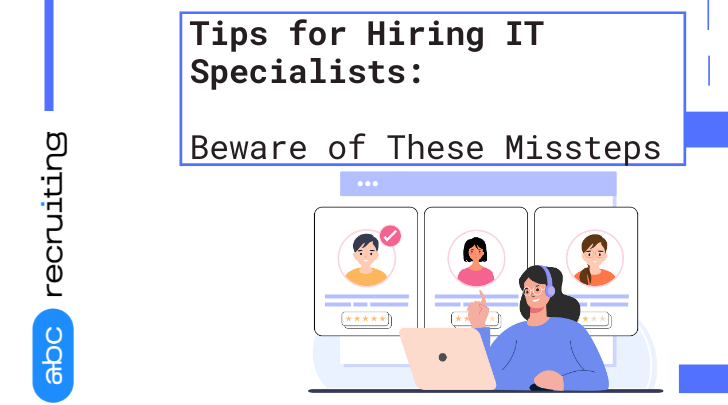Most companies in the IT industry have experienced their fair share of hiring headaches. You know the ones—where you think you've found the perfect candidate, but upon closer examination, they don't quite live up to expectations.
Hiring unsuitable IT specialists can be a costly misstep that can set your business back weeks or even months. But with the right recruitment process in place, you can avoid such headaches and attract the best possible talent. In this article, we'll share tips and advice on how to avoid common IT recruitment pitfalls.
From knowing exactly what kind of specialist you're looking for to evaluating their skillset before hiring, we'll discuss everything you need to know about creating a successful recruitment process. Whether you're looking for an individual contractor or a team of highly specialized tech wizards, knowledge is power and forewarned is forearmed!
Taking a DIY Approach to IT Recruitment
When it comes to IT recruitment, many companies think they can handle the process on their own. But taking a DIY approach isn't always the best strategy. After all, recruiting the right IT specialists is a critical task that requires thorough screening and technical subject matter expertise—something that internal teams often lack.
Furthermore, an in-house recruiting team may be too expensive or too time-consuming for some companies. That's why it's important to outsource experienced IT recruiters who have the specialized know-how and proper processes to work efficiently and effectively.
To make sure you don't misstep in your hiring process, consider partnering with an agency that specializes in recruiting IT specialists, especially if you don't have someone on board with subject expertise or extensive experience in tech recruitment. Such an agency will help to ensure you're hiring top talent while freeing up valuable time and resources internally.
Not Doing Your Homework on Candidates

Before you even consider hiring a potential IT specialist, you should do your homework. After all, it's easy to read a resume, but it's harder to dig further and uncover the truth about a candidate.
First, you should research any professional references included in their application. This will give you an indication of the type of job they previously did and how successful they were at it. You should also look into any projects they have led or been involved in so that you can assess their skillset in greater detail.
The bottom line is that there is no one-size-fits-all approach to recruitment. Whether you're looking for someone who has experience with a specific technology or an individual who excels at problem-solving and customer service, taking the time to really get to know your potential hire will pay off in the long run. Doing your research beforehand ensures that you won't make any missteps during the hiring process!
Ignoring Early Warning Signs of Potential Problems
It can be easy to overlook warning signs of potential problems when you're recruiting IT specialists. Perhaps they come across as confident in their interview and have the right technical skills, so you move forward. But ignoring signs of potential problems might put your IT team at risk down the road.
Here are some signs you should look out for when screening potential tech hires:
- Inability to think outside the box: Ask them to describe a project that they created that required innovative thinking. Try to gage their problem-solving capabilities and ability to think outside the box.
- Poor communication skills: Communication is key for any successful team, especially in IT where details are critical. Ask questions throughout the recruitment process that reveal candidate's ability to communicate efficiently and effectively with technical teams and non-technical staff alike.
- Limited technical skills outside of specialized area: Assess their knowledge of technologies beyond their specialty area — this will help you gain good insight into the candidate's overall capabilities and whether or not it aligns with your IT needs going forward.
Remember to keep an eye out for these red flags during your recruitment process, as they can be indicative of bigger issues down the line if left unchecked!
Failing to Provide Ongoing Support for IT Specialists
Another misstep you want to avoid is failing to provide ongoing support for IT specialists you hire. It’s important to remember that these technical experts need more than just basic supervision, they need support in order to do their job effectively.
Create Career Paths
It’s important to provide clear career paths for your IT specialists so they understand what opportunities may arise with your organization as they develop their skills and expertise. Understand where their technical knowledge and experience fits within the overall business operations of your company and make sure there are potential paths of development or growth for them.
Offer Training Programs
IT specialists should have access to suitable resources and training programs in order for them to stay competitive in the current market. Think about creating a centralized repository of documents, tutorials, films or webinars that will help keep employees up-do-date in terms of technology and best practices within your industry.
Communication and Collaboration
It’s also critical for you as an employer to foster a culture of communication and collaboration among IT staff members so they can perform at a higher level together. Building trust and respect between team members is essential when it comes to problem solving which will take some time but could pay off big dividends in the long run.
Settling for Less Than Top-Tier IT Talent
You may think you're saving money by minimizing hiring costs for less-than-top-tier IT talent, but if the team is lacking in skills or experience, it can cost you more in the long run. You'll be stuck with inferior service and lack of support when you need them most. Plus, it's more work to keep teams up to speed and up to date.
Therefore, it pays to make sure that you hire the best possible IT talent. Here are some tips that can help ensure you get the highest quality candidates:
- Have a clear job description—list out your expectations and essential qualifications so that potential hires have an understanding of what you need.
- Ask for references—demonstrated success is a great way to determine if a candidate is right for the job. Ask for references from companies they have previously worked with or managed projects for.
- Consider remote IT specialists—some of the best IT talent is located outside of your area, so don't discount remote workers who might be able to provide great service from afar.
- Make sure their skills match your needs—evaluate their technical knowledge and certifications to make sure they have a relevant background in whatever technologies and approaches you expect them to use on your project or team.
- Pay competitively—it's one thing to scrimp on quality, but completely another when it comes to pay. Quality IT professionals expect market wages; undercutting them will only lead them elsewhere in search of better opportunities and benefits packages..
With these tips in mind, you'll be well positioned to choose experienced professionals who will deliver exceptional value throughout their tenure at your company!
Conclusion
As IT companies continue to navigate the ever-changing landscape of recruitment, it's important to keep certain factors in mind when selecting and hiring IT specialists. When companies overlook certain details, they run the risk of wasting time, money and effort.
From anticipating the skill sets needed, to being aware of the industry trends, to double-checking candidate qualifications, every step of an IT recruitment process requires focus, precision and dedication in order to ensure success.
By avoiding these missteps and following the above tips, you can take the guesswork out of IT recruitment and be sure that you're hiring the perfect fit for the job.




